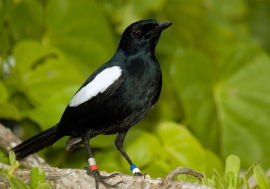Small steps can make a big difference
Small steps can make a big difference
The Millennium Development Goals (MDGs), which include halving world poverty and slashing child mortality by two-thirds, are as challenging as they are ambitious, Mr. Sachs said at UN headquarters in New York in late September, in briefings on the work of the Millennium Project, which he directs. But meeting those goals, said Mr. Sachs, can be as simple as distributing a $1.50 mosquito net or providing a family farmer with a sack of fertilizer. "These are not metaphysical problems. These are not grand cultural problems. . . . These are practical problems, and they don't cost very much money."
Mr. Sachs asserted that while substantial progress has been made in some regions of the world, "Africa on the whole has not achieved progress and has experienced significant regress in many areas." The continent is the epicentre of global poverty, he continued. World leaders are slated to review progress towards the goals in September 2005.
The reasons for Africa's halting progress are numerous, he said, including poor soils, the effects of climate change and shortages of basic transportation and communications. But these problems have been worsened by the donor community's insistence on market mechanisms, inadequate and poorly targeted aid and a tendency to blame Africa. The continent's problems "cannot be folded under the rubric that poor Africa just doesn't govern itself properly," Mr. Sachs observed. "Blaming the poor will not solve the problem. Nor is it an accurate, analytical picture" of the obstacles to Africa's development.
Nitrogen deficiency is a major impediment to improving crop yields in Africa, he said, yet structural adjustment policies eliminated government fertilizer subsidies and raised fertilizer prices beyond the means of Africa's poor - and mostly female - farmers. "We are sending hundreds of millions of Africans out to farm their fields today with no biophysical chance of growing a crop - and when the crop fails we send a mission from someplace to tell them to govern better."
Similar problems are hampering the drive against malaria (see article "Africans push to tame malaria"), with donors insisting that Africans purchase insecticide-treated mosquito nets under a private-sector approach known as "social marketing." Less than 1 per cent of rural African families can afford these highly effective nets, he said. They should be free. "Mothers and children are dying of a completely preventable disease because we are trying to sell bed nets. Let me urge the end of social marketing today."
Ultimately, Mr. Sachs declared, many of Africa's challenges could be overcome with more financing, "but we are not solving practical problems because we don't want to talk about money." Although official development assistance to developing countries has begun to inch back up after a decades-long decline, only a handful of donors have reached the internationally-agreed target of 0.7 per cent of gross domestic product. Development aid to Africa remains far below the additional $40 bn required annually to achieve the MDGs by the 2015 deadline.
"We have the resources to save millions of lives and raise the basic infrastructure of Africa . . . to a level where Africa truly can become part of the global economy," he concluded. "We need to support practical investments on the ground."














